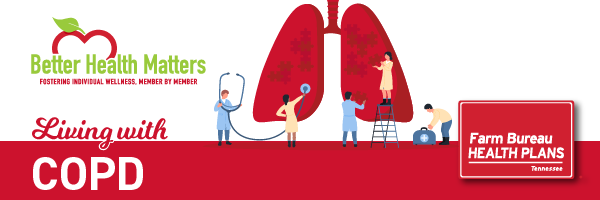Important Information for Medicare Members: Understanding COPD and Your Coverage

Important Information for Medicare Members: Understanding COPD and Your Coverage
Chronic obstructive pulmonary disease (COPD) is a long-term lung disease that makes breathing difficult. It includes emphysema and chronic bronchitis, and many people with COPD have both conditions. According to the National Institutes of Health (NIH), over 12 million Americans are diagnosed with COPD, and another 12 million likely have it without knowing.
What Causes COPD?
COPD is most commonly caused by smoking cigarettes, though up to 25% of people with COPD have never smoked. Other contributors include secondhand smoke, air pollution, and exposure to chemical fumes or dust. COPD develops gradually, and early symptoms may be overlooked.
Early Symptoms of COPD to Watch For:
Medicare Coverage for COPD Treatment
Although there is no cure for COPD, treatments and lifestyle changes can help manage symptoms and slow its progression. Here’s how Medicare can help:
1. Quitting Smoking
The most important step in managing COPD is quitting smoking. Medicare Part B covers smoking cessation counseling, offering up to 8 face-to-face visits per year. Nicotine patches and other smoking aids may also be covered.
2. Oxygen Therapy
For severe COPD cases, oxygen therapy may be required. Medicare Part B helps cover oxygen therapy, including the rental of oxygen equipment and supplies. Coverage is provided if the oxygen is supplied by a contracted durable medical equipment (DME) provider. Beneficiaries are responsible for a 20% coinsurance after meeting the Part B deductible.
3. COPD Medications and Bronchodilators
Depending on the severity of your symptoms, your doctor may prescribe bronchodilators, inhaled steroids, or both. These medications, which help open airways and improve breathing, are typically covered under Medicare Part D. Copayment amounts will depend on your specific Part D plan.
4. Pulmonary Rehabilitation
Medicare Part B also covers pulmonary rehabilitation for moderate to severe COPD. This program may include exercise, education, and counseling to help maintain normal daily activities. Medicare covers up to two sessions per day for a total of 36 lifetime sessions, which can be provided in a doctor’s office or a hospital outpatient setting.
If you’re experiencing symptoms of COPD, don’t wait for them to worsen. Talk to your doctor about getting screened and starting treatment early.
For more information about COPD, visit the National Heart, Lung, and Blood Institute or the American Lung Association. To learn more about how Medicare can help with COPD, visit Medicare.gov or contact the Medicare Helpline at 1-800-MEDICARE (1-800-633-4227), TTY 1-877-486-2048.
What Causes COPD?
COPD is most commonly caused by smoking cigarettes, though up to 25% of people with COPD have never smoked. Other contributors include secondhand smoke, air pollution, and exposure to chemical fumes or dust. COPD develops gradually, and early symptoms may be overlooked.
Early Symptoms of COPD to Watch For:
- Persistent cough, often with mucus
- Shortness of breath, especially during physical activity
- Wheezing (whistling sound while breathing)
- Chest tightness
Medicare Coverage for COPD Treatment
Although there is no cure for COPD, treatments and lifestyle changes can help manage symptoms and slow its progression. Here’s how Medicare can help:
1. Quitting Smoking
The most important step in managing COPD is quitting smoking. Medicare Part B covers smoking cessation counseling, offering up to 8 face-to-face visits per year. Nicotine patches and other smoking aids may also be covered.
2. Oxygen Therapy
For severe COPD cases, oxygen therapy may be required. Medicare Part B helps cover oxygen therapy, including the rental of oxygen equipment and supplies. Coverage is provided if the oxygen is supplied by a contracted durable medical equipment (DME) provider. Beneficiaries are responsible for a 20% coinsurance after meeting the Part B deductible.
3. COPD Medications and Bronchodilators
Depending on the severity of your symptoms, your doctor may prescribe bronchodilators, inhaled steroids, or both. These medications, which help open airways and improve breathing, are typically covered under Medicare Part D. Copayment amounts will depend on your specific Part D plan.
4. Pulmonary Rehabilitation
Medicare Part B also covers pulmonary rehabilitation for moderate to severe COPD. This program may include exercise, education, and counseling to help maintain normal daily activities. Medicare covers up to two sessions per day for a total of 36 lifetime sessions, which can be provided in a doctor’s office or a hospital outpatient setting.
If you’re experiencing symptoms of COPD, don’t wait for them to worsen. Talk to your doctor about getting screened and starting treatment early.
For more information about COPD, visit the National Heart, Lung, and Blood Institute or the American Lung Association. To learn more about how Medicare can help with COPD, visit Medicare.gov or contact the Medicare Helpline at 1-800-MEDICARE (1-800-633-4227), TTY 1-877-486-2048.
Visit a Farm Bureau Office
There are 200+ offices throughout Tennessee, so stop by and see us.
